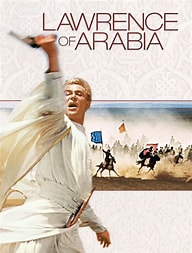David Lean's "Lawrence of Arabia" is not just a film—it is a memorable cinematic experience that has endured as a timeless classic for more than six decades. From its vast desert landscapes to its intricate depiction of heroism and identity, the film is epic in both scale and subject matter. It takes audiences on an extensive journey through the Middle East during World War I, portraying the tumultuous and often contradictory path of T.E. Lawrence, a British officer who became an unexpected leader in the Arab revolt against the Ottoman Empire. It is a story of ambition, transformation, and tragedy that remains as powerful today as it was at the time of its release. At the heart of "Lawrence of Arabia" is Peter O'Toole's unforgettable portrayal of T.E. Lawrence. O'Toole brings both sensitivity and charisma to the role, depicting Lawrence not as a conventional hero but as a man in search of meaning and belonging. His performance is subtle and layered, reflecting the inner conflict between Lawrence's idealistic vision of uniting the Arabs and his personal demons. He is a man of contradictions—brave yet profoundly insecure, visionary yet dangerously obsessive. O'Toole's ability to portray his character's shifting loyalties and tormented soul makes Lawrence one of the most complex characters in cinematic history. O'Toole is the anchor of the film, with Lawrence of Arabia featuring a remarkable ensemble cast that helps elevate the story. Alec Guinness's portrayal of Prince Faisal, the leader of the Arab revolt, is dignified and restrained, adding a sense of gravity to the political intrigues surrounding Lawrence. Guinness's performance is one of quiet power, highlighting Faisal's patience and political acumen.Umer Sharif is captivating in the role that defines his career as Sharif Ali. Sharif's presence on screen is calm and impressive, and the deepening relationship between Lawrence and Sharif Ali adds emotional weight to this expansive geopolitical drama. But beyond the brilliant acting, it is the film's technical excellence that makes it special. Freddy Young's cinematography is nothing short of miraculous. The vastness of the desert is captured in wide, panoramic shots that convey the isolation of the environment and its harsh beauty.The use of natural light, especially during the famous scenes of Lawrence crossing the Nejd desert, makes the landscape feel like an active character in the story. Lawrence riding a camel toward the horizon, with the endless barren expanse before him, has become one of the most iconic scenes in film history. Young's camerawork not only captures the desert but also reflects Lawrence's psychological journey—lonely, harsh, yet magnificent. Maurice Jarre's Oscar-winning music is an integral part of the film's emotional resonance.The music, with its extensive orchestral arrangement and evocative Middle Eastern themes, resonates with the vast scale of the story while subtly highlighting its deep emotional flow. Jarre's poignant melodies underscore Lawrence's journey from an innocent outsider to a man immersed in his own myth, and combined with the visuals, the music elevates the film to an exceptional level. The powerful theme of 'The Voice of the Guns' lingers in cinematic memory, embodying the film's exploration of war, power, and the search for identity. At its core, 'Lawrence of Arabia' is a story that goes far beyond desert warfare or military strategy—it is a psychological and philosophical exploration of the cost of identity and ambition. Lawrence is a man who wants to prove himself not only to his British superiors but also to the Arabs he leads, and most of all, to himself. His internal journey is as turbulent as his external one, and the film raises profound questions about loyalty, betrayal, and the nature of leadership. Lawrence's rise and fall can be seen as a metaphor for the dangers of idealism and the complexities of colonialism. His efforts to unite different factions in the name of Arab independence are undermined by both the British Empire and his own growing disillusionment with his role in the revolt.The film does not offer any easy answers, and Lawrence's ultimate fate is both tragic and ambiguous, serving as a commentary on the fragility of power and the fleeting nature of fame. In terms of historical accuracy, 'Lawrence of Arabia' takes some liberties with the facts, as is often the case with epic films. While Lawrence's involvement in the Arab Revolt is broadly accurate, the film sometimes distorts events for dramatic effect, and some characters are presented either fictionally or briefly. The portrayal of Arab characters, especially in the context of British colonialism, has been criticized for its lack of depth and nuance. Although the film attempts to depict Arab leadership, it sometimes falls into the trap of presenting them through a Western lens. These criticisms are valid, but they do not diminish the power of Lean's story. Modern audiences, accustomed to fast-paced stories, may find the film's pace slow, especially given its 222-minute runtime. Yet, the deliberate pace allows for a deep immersion into the grandeur of the characters and landscapes. The tension gradually building throughout the film ultimately pays off in its climax, where the clash between Lawrence's personal and political worlds evokes a sense of inevitability. Ultimately, 'Lawrence of Arabia' is not just a historical drama; it is a reflection on human conditions—the blurred lines between identity, loyalty, power, heroism, and pride. It is a film that needs to be experienced on the grandest scale possible, not just for its epic action scenes, but for its intellectual and emotional depth as well. The desert, with all its beauty and danger, becomes a metaphor for Lawrence's soul—vast, mysterious, and full of contradictions. Released in 1962, Lawrence of Arabia was successful both commercially and critically, winning seven Academy Awards for David Lean, including Best Picture and Best Director. It remains a major achievement in the history of cinema—a film that blends artistry with deep exploration of its subject matter. Although it does not provide easy answers, it leaves an indelible impression that continues to provoke thought long after the credits roll. In the decades following its release, Lawrence of Arabia’s stature has only grown, inspiring filmmakers, actors, and audiences alike. For those who have not yet seen it, this cinematic masterpiece is a must-watch—one of those rare films that transcends its time and place, offering profound insight into human emotions and the complex world we inhabit.

Lawerence of Arabia Credit: Internet
Posted inFilm Review

